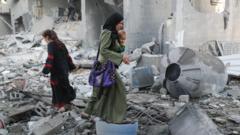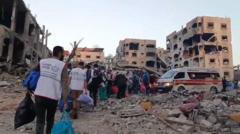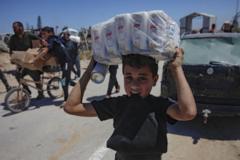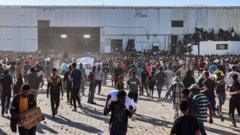In a recent interview, the UN's humanitarian chief highlighted dire conditions in Gaza, accusing Israel of practices tantamount to war crimes as aid efforts are complicated by ongoing conflict.
**UN Humanitarian Chief Accuses Israel of Enforcing Starvation in Gaza**
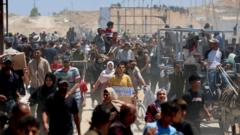
**UN Humanitarian Chief Accuses Israel of Enforcing Starvation in Gaza**
Tom Fletcher claims Israeli actions amount to forced starvation, prompting international concern.
In a stark interview with the BBC, UN humanitarian chief Tom Fletcher articulated his concerns about the humanitarian situation in Gaza, claiming that Israel's actions are leading to forced starvation among its civilian population. This assertion marks a significant point of contention in the ongoing conflict, as diplomatic discussions surrounding humanitarian aid have gained urgency.
Fletcher described how a severe blockade lasting nearly three months had slowed essential supplies into Gaza, including food, medicine, and shelter. He indicated that while some aid has begun to trickle through following the easing of the blockade, chaos erupted at distribution centers as desperate Palestinians flocked in search of food. The UN has claimed that 47 people were injured in the mayhem occurring at these sites.
During the interview, Fletcher did not shy away from characterizing the resultant effects of the blockade on the population as a potential war crime. He indicated that the international community's perspective on Israel's operations might be shifting, which has been echoed by various world leaders expressing growing concern over the conduct of military actions within Gaza.
His comments come amidst severe tensions following Israel's resumed military offensive, which concluded a temporary ceasefire with Hamas in response to the group's capture of hostages. The Israeli government has justified its military actions by positioning them as necessary measures for national security, emphasizing the need to pressure Hamas for the release of hostages still held.
The humanitarian chief also expressed regret over sensational comments he previously made regarding potential casualties among infants in Gaza, emphasizing the need for careful statements given the gravity of the circumstances. He reiterated the importance of maintaining humanitarian principles in these discussions and called upon Israeli Prime Minister Benjamin Netanyahu to disavow rhetoric that could imply forced displacement of Gazans.
Fletcher's statements align with growing international scrutiny towards Israel's tactics, with European leaders calling for a humane approach that allows for effective humanitarian assistance. Prompting further international dialogue, Fletcher stressed the urgency for the UN Security Council to take preemptive actions to avert potential genocide, reflecting historical moments where inaction could be deemed culpable by future generations.
In this context, Fletcher dismissed Israeli allegations that Hamas was appropriating aid supplies, emphasizing the need for humanitarian efforts to prioritize civilians. He acknowledged the profound dangers facing humanitarian missions globally, citing crises in regions like Ukraine and Sudan, and described a troubling increase in conflict between nations, underscoring the imperative of diplomatic resolutions over military engagements.
As the situation in Gaza unfolds, Fletcher's appeal highlights the complicated intersection of humanitarian advocacy and geopolitical dimensions, challenging stakeholders to navigate a path forward that respects human rights and seeks stability in the region.


